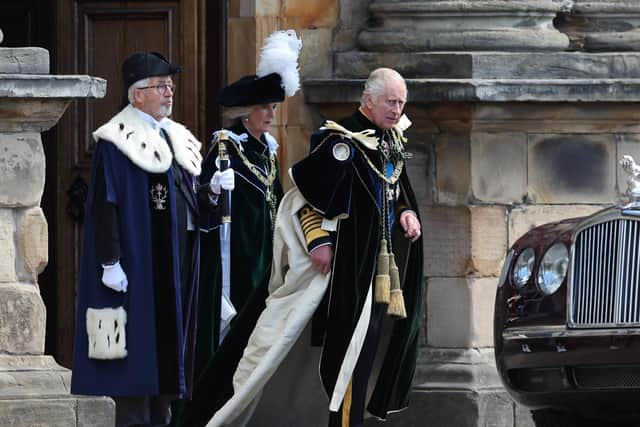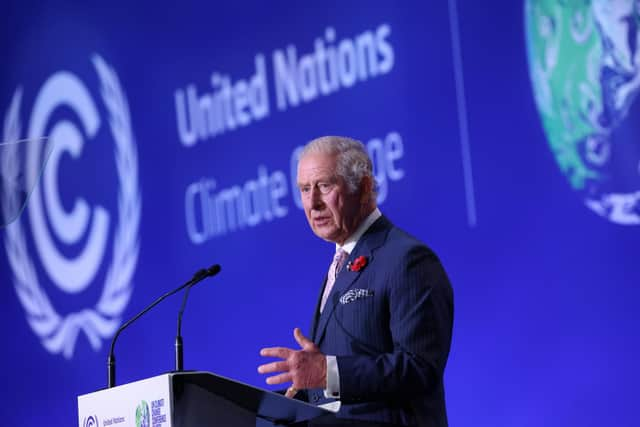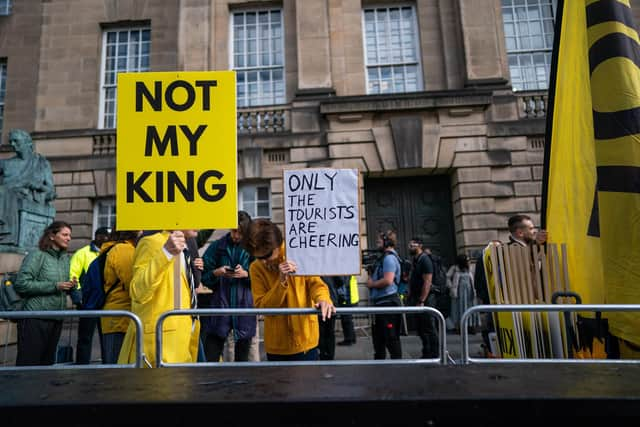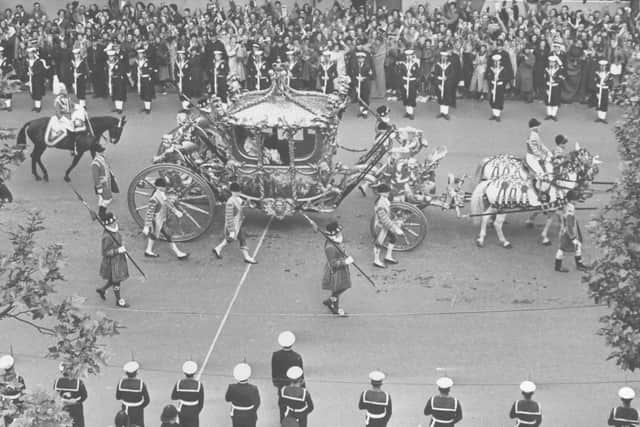'Not my king': What being a republican means in the UK and what Britain could look like as a republic
With the coronation of King Charles III being marked with a service of thanksgiving and dedication in Scotland, anti-monarchy protesters have made their thoughts known.
Crowds gathered along Edinburgh's Royal Mile to mark the "second coronation", but the King's procession from the Palace of Holyroodhouse to St Giles' Cathedral was accompanied with chants of "not my king" and signs stating "Only the tourists are cheering".
Advertisement
Hide AdAdvertisement
Hide AdAccording to YouGov statistics, seven in 10 Scots didn't care about the King’s coronation – which is one of the most expensive events ever held in Britain.


Support for the royal family in the UK, particularly among younger generations, has dropped and almost 40% of 18-24 year olds say they would prefer an elected head of state in a recent YouGov poll. Though the poll’s overall results suggest a broader support for the so-called “firm”, it should be noted that 78% of those who support the monarchy are over-65.
But what would the UK look like without the royal family? Here's what it means to be a republican mean in the UK, and what Britain could be like as a republic.
The King as head of state
The UK is currently a constitutional monarchy, a system of government which sees a monarch share power with a constitutionally organised government.
The UK government is democratically elected, and the head of state – now King Charles III – acts mostly as a ceremonial leader, who holds little true power over how laws are established and the country is run.
Though without political power, the King’s role as head of state is still very involved with parliament.
Some of King Charles’s duties include appointing ministers and the Prime Minister, giving royal assent to laws passed by parliament and announcing the government’s legislative programme for the coming year in the King’s Speech.
His presence in UK politics doesn’t necessarily equal influence, however, as the King's autonomy in this role is limited. In all of his actions as head of state, he is acting on the advice of the government.
Advertisement
Hide AdAdvertisement
Hide AdAn example of this supposed “neutrality” is King Charles’s appearance – or lack thereof – at COP27. When COP26 was held in Glasgow, Charles – who has been a vocal environmentalist for much of his life – made the opening address at the ceremony.


Acting on the advice of the Prime Minister, and in his new role as head of state, King Charles did not attend COP27.
His neutrality as an unelected head of state, republicans argue, is an issue. They say having the King in a role which is a “crucial part of the political system” means there are important jobs he cannot do as an unelected official.
But before we examine that more closely, what exactly does it mean to be a republican in the UK?
Republican meaning UK
Essentially, UK republicans want to see the monarchy abolished and an elected head of state brought in.
They argue that the King and royal family are unable to be held to account democratically, and as such there is nothing to stop potential abuses of power.
Given the UK’s current political system, another reason behind calls to establish a republic is that the King – who must remain neutral – acts in the interests of the government and not ordinary people.


Often in the UK, the monarch is described as a “ceremonial head of state”. This has been labelled as misleading by anti-monarchists, who argue that while neutrality is necessary, the head of state must be independent of government in order to act as an extra check on power.
Advertisement
Hide AdAdvertisement
Hide AdPressure group Republic states the UK deserves an elected head of state who should: represent the nation, defend democracy, act as a referee in the political process and offer a non-political voice at times of crisis and celebration.
While establishing a constitutional head of state is a large part of republicans in the UK, other reasons behind calls to abolish the monarch include discussions surrounding taxpayer money being used to fund the royal lifestyle and events.
What would the UK be like as a republic?
The Queen acted as the UK’s head of state for 70 years. Since her death, discussions surrounding the future of the monarchy have intensified following King Charles’ ascent to power.
Perhaps one of the biggest challenges facing the King will be maintaining public support and goodwill, and shutting down calls for the UK to become a republican state.
Republicans argue that having an elected head of state will allow for more intervention if a government were to overextend their power.


For example, if there were strong public opposition to a bill the head of state could then consult the public through a referendum – something they argue is vital in a democracy.
Despite this, many people don’t think abolishing the monarchy would truly change much about Britain. These powers are still technically available to King Charles – though it’s unlikely, due to his position as Monarch, he would ever use them to their full extent.
The British public knows what Charles believes in. As Prince of Wales he never shied away from championing causes – but will he be able to remain neutral as King?
Advertisement
Hide AdAdvertisement
Hide AdThe real difference is that if an elected head of state were to overstep, they would have to answer to the public and could be removed from office – unlike a royal.
Potential model countries for the UK include the Republic of Ireland and Germany – both of which currently have elected heads of states.